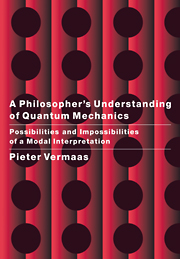 A Philosopher's Understanding of Quantum Mechanics
A Philosopher's Understanding of Quantum Mechanics Book contents
- Frontmatter
- Contents
- Preface
- 1 Introduction
- 2 Quantum mechanics
- 3 Modal interpretations
- Part one Formalism
- Part two Physics
- Part three Philosophy
- 12 Properties, states, measurement outcomes and effective states
- 13 Holism versus reductionism
- 14 Possibilities and impossibilities
- 15 Conclusions
- Appendix A From the bi to the spectral modal interpretation
- Glossary
- Bibliography
- Index
13 - Holism versus reductionism
Published online by Cambridge University Press: 28 October 2009
- Frontmatter
- Contents
- Preface
- 1 Introduction
- 2 Quantum mechanics
- 3 Modal interpretations
- Part one Formalism
- Part two Physics
- Part three Philosophy
- 12 Properties, states, measurement outcomes and effective states
- 13 Holism versus reductionism
- 14 Possibilities and impossibilities
- 15 Conclusions
- Appendix A From the bi to the spectral modal interpretation
- Glossary
- Bibliography
- Index
Summary
In quantum mechanics the properties of a composite system can be divided into properties which are reducible to the properties of the subsystems of the composite and properties which are irreducible to those subsystem properties. The irreducible properties are called holistic and emerge when one describes the system as a whole.
In this chapter I show that the bi and spectral modal interpretations can ascribe the holistic properties to composites but, in general, fail to reproduce the relations between the reducible properties of a composite and the properties of the subsystems. The atomic modal interpretation, on the other hand, fails to ascribe the holistic properties but is much more successful in reproducing the relations between the reducible properties and the subsystem properties. I discuss whether these failures harm the empirical adequacy and the metaphysical tenability of modal interpretations.
Holistic properties of composite systems
The basic principle of reductionism, that all the properties of composite systems are amalgamates of the properties of the subsystems of these composites, has triumphed so much in classical physics that I find it difficult to come up with a clear example of a classical property that cannot be taken as a complex of the subsystem properties. So, in order to make a case for the idea that composites can also possess, in addition to reducible properties, so-called holistic properties which cannot be reduced to the properties of the subsystems, one has to move outside physics or to draw upon some counterfactual development of physics.
- Type
- Chapter
- Information
- A Philosopher's Understanding of Quantum MechanicsPossibilities and Impossibilities of a Modal Interpretation, pp. 224 - 251Publisher: Cambridge University PressPrint publication year: 2000


